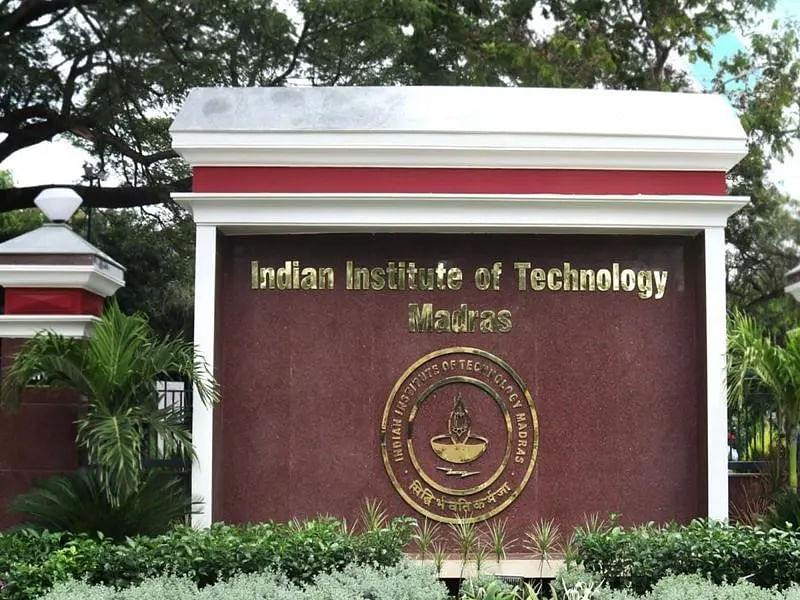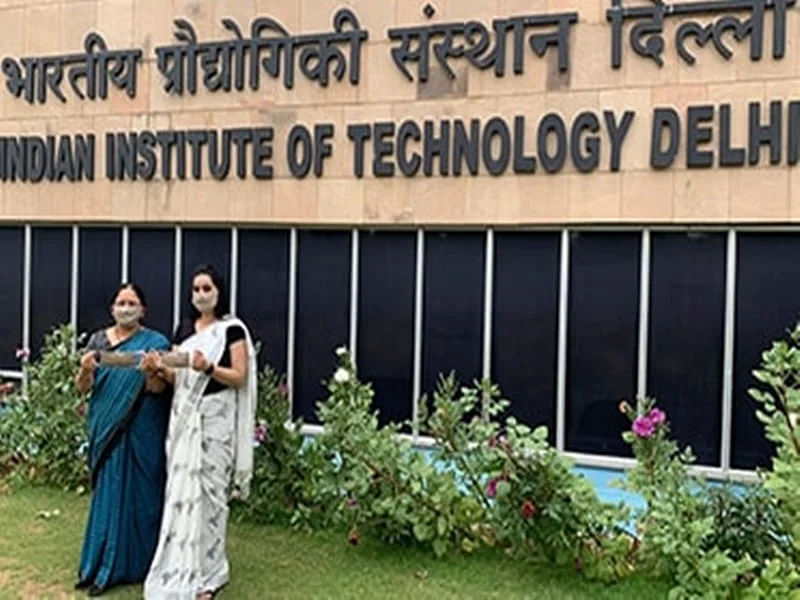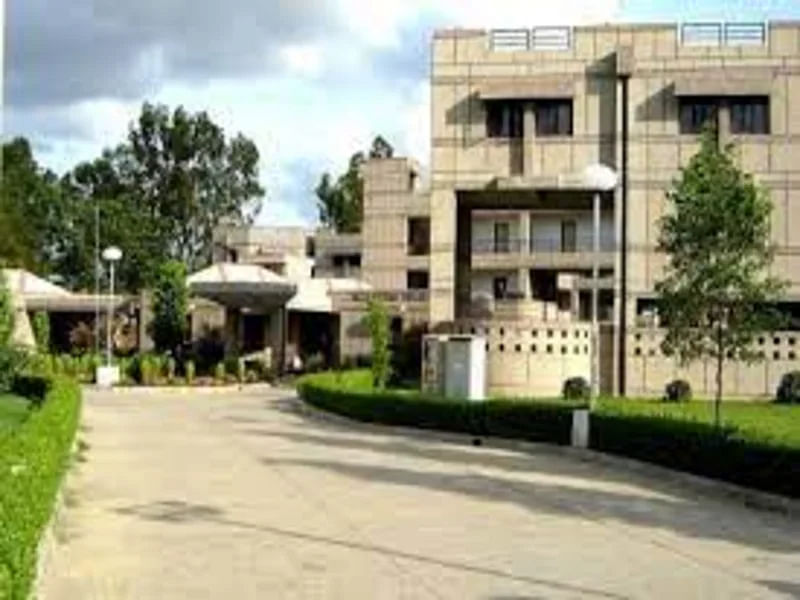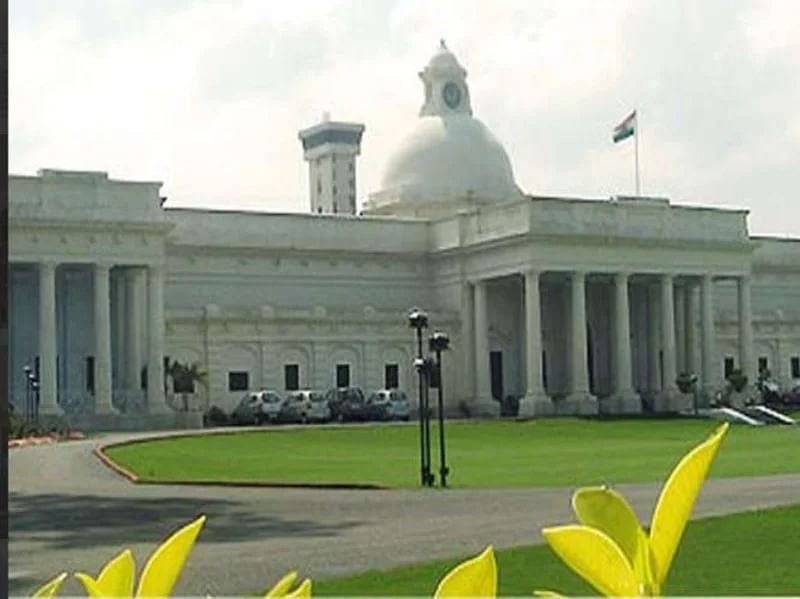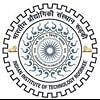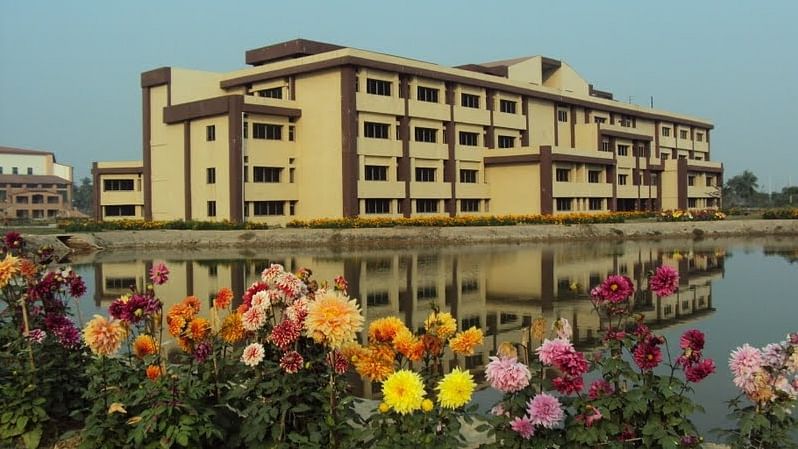B.Tech Chemical Engineering Syllabus and Subjects

The B.Tech Chemical Engineering syllabus covers important topics such as Organic Chemistry, Chemical Reaction Engineering, Thermodynamics, Chemical Process Calculations, Process Control, and more. The B.Tech Chemical Engineering curriculum is strategically divided into eight semesters spanning a period of four years.
The B.Tech Chemical Engineering subjects are offered as core and elective courses. The core B.Tech Chemical Engineering subjects include Engineering Chemistry, Physical Chemistry, Transport Phenomena, Process Equipment Design, etc. The elective subjects include topics such as Electrochemical Engineering, Biochemical Engineering, Energy Technology, Petroleum Technology, etc.
The syllabus of B.Tech Chemical Engineering includes a combination of core subjects, elective offerings, practical and laboratory sessions, projects, internships, and projects that equip students with a comprehensive understanding of the fundamental and advanced aspects of chemical engineering.
Table of Contents
B.Tech Chemical Engineering Syllabus Semester Wise
The BTech in Chemical Engineering syllabus is based on the recommendations made by the All India Council of Technical Education (AICTE). Hence, the syllabus of chemical engineering followed in most colleges is usually similar with slight variations in their subject offerings.
The semester wise B Tech Chemical Engineering syllabus is detailed in the sections below.
B.Tech Chemical Engineering Syllabus 1st Year
The first year Chemical Engineering B Tech syllabus focuses on basic science and engineering topics such as engineering mathematics, engineering physics, basic electronics engineering, engineering graphics, etc.
Listed below is the B.Tech Chemical Engineering syllabus for the 1st and 2nd semester:
| Semester I | Semester II |
| Communicative English | Environmental Studies |
| Engineering Chemistry I | Engineering Mechanics |
| Engineering Mathematics I | Engineering Chemistry II |
| Engineering Physics | Engineering Mathematics II |
| Engineering Graphics | Basic Electronics Engineering |
| Basic Electrical Engineering | Computer Programming |
Practical Topics For B.Tech Chemical Engineering Syllabus 1st Year
The practical topics for the first year BTech Chemical Engineering syllabus are listed below.
- Engineering Physics Laboratory
- Engineering Chemistry Laboratory
B.Tech Chemical Engineering Syllabus 2nd Year
The B.Tech Chemical Engineering subjects second year deal with topics such as fluid mechanics, thermodynamics, heat transfer, mechanical engineering, etc.
The BTech Chemical Engineering second year syllabus is detailed in the table below:
| Semester III | Semester IV |
| Physical Chemistry | Heat Transfer Operations |
| Fluid Mechanics | Organic Chemistry |
| Chemical Process Calculations | Mass Transfer I |
| Chemical Engineering Thermodynamics I | Chemical Engineering Thermodynamics II |
| Solid Mechanics | Mechanical Operation |
| Process Equipment Design I | Elective II |
| Elective I | - |
Practical Topics for B.Tech Chemical Engineering Syllabus 2nd Year
Listed below are the practical topics for the syllabus of B Tech Chemical Engineering.
- Fluid Mechanics Laboratory
- Thermodynamics Laboratory
- Mechanical Operations Laboratory
B.Tech Chemical Engineering Syllabus 3rd Year
The third year B.Tech Chemical Engineering syllabus explores advanced topics such as chemical reaction engineering, process control, transport phenomena, and more.
Listed below is the BTech Chemical Engineering syllabus 3rd year:
| Semester V | Semester VI |
| Engineering Mathematics III | Numerical Methods in Chemical Engineering |
| Mass Transfer II | Chemical Reaction Engineering II |
| Chemical Reaction Engineering I | Process Dynamics & Control |
| Transport Phenomena | Chemical Process Modelling and Simulation |
| Chemical Process Technology | Materials Science for Chemical Engineers |
| Process Equipment Design II | Elective IV |
| Elective III | - |
Practical Topics for BTech Chemical Engineering Syllabus 3rd Year
The B.Tech Chemical Engineering Syllabus 3rd year practical topics are given below.
- Mass Transfer Laboratory
- Chemical Reaction Engineering Laboratory
- Chemical Process Simulation Laboratory
B.Tech Chemical Engineering Syllabus 4th Year
The BTech Chemical Engineering subjects included in the fourth year syllabus include process design, chemical process safety, pollution control in process industries, industrial management, and more.
Below listed is the B.Tech Chemical Engineering fourth year syllabus:
| Semester VII | Semester VIII |
| Process Design & Project Engineering | Industrial Management |
| Process Equipment Design III | Pollution Control in Process Industries |
| Separation Processes | Chemical Process Safety and Risk Management |
| Elective V | Elective VI |
| Project I | Project II |
| Industrial Visit / Training | Comprehensive Viva Voce |
Practical Topics for B.Tech Chemical Engineering Syllabus 4th Year
Listed below are the B.Tech Chemical Engineering practicals topics for the 4th year syllabus.
- Process & Product Design Laboratory
- CAD Laboratory
B.Tech Chemical Engineering Subjects
The B.Tech Chemical Engineering subjects provide an extensive understanding of the chemical processes involved in the production of products of industries such as petrochemicals, agrichemicals, nanotech, biomedical, and more.
The B.Tech Chemical Engineering core and elective subjects equip students with a strong foundation in principles of engineering and chemical processes and applications through a structured blend of theoretical and practical coursework. The B.Tech Chemical Engineering subjects semester wise are listed in the table below..
B.Tech Chemical Engineering Subjects First Year
The Chemical Engineering subjects in BTech first year include topics such as Surface Chemistry, Engineering Chemistry, Work Energy, etc.
The first year BTech Chemical Engineering subjects are detailed in the table below:
| Subjects | Topics Covered | Subject Type |
| Communicative English | Reading, Comprehension, Vocabulary Development, Grammar, Language Development, Technical Writing | Core |
| Engineering Chemistry I | Water Treatment, Polymers, Electrochemical Cells, Corrosion And Its Control, Phase Rule | |
| Engineering Mathematics I | Differential Calculus, Multiple Integrals and Applications, Analytical Solid Geometry, Differential Equations | |
| Engineering Physics | Properties of Matter, Waves and Fiber Optics, Thermal Physics, Quantum Physics, Crystal Physics | |
| Engineering Graphics | Plane Curves, Freehand Sketching, Projections of Points, Lines, and Plane Surface, Projection of Solids, Isometric and Perspective Projections | |
| Basic Electrical Engineering | Kirchoff’s Laws, Series and Parallel Circuits, DC Circuits, AC Circuits, Three Phase System, DC Generator and Motor, AC Transmission, Distribution System. | |
| Environmental Studies | Environmental Segments and Natural Resources, Ecosystem and Biodiversity, Air Pollution, Water Pollution and Solid Waste Management Sources, Social Issues and the Environment | |
| Engineering Mechanics | Equivalent Force Systems, Trusses, Frames, Beams, Method of Joints, Method of Section, Dry Friction, Kinetics of Particles, Work Energy | |
| Engineering Chemistry II | Surface Chemistry, Catalysis, Alloys, Fuels, Combustion, Nuclear Fission, Energy Sources | |
| Engineering Mathematics II | Algebra, Matrices, Trigonometry, Vector Analysis, Statistics | |
| Basic Electronics Engineering | Half Wave Rectifier, Full Wave Rectifier, Amplifiers, RTD, LVDT, Boolean Algebra, Combinational Logic, Communication System | |
| Computer Programming | Von Neumann Architecture, Machine Language, Assembly Language, Programming Languages, Advanced Programming Features, Data Structures | |
| Engineering Physics Laboratory | Physics Concepts Applied in Optics, Thermal Physics, Properties of Matter and Liquids | Laboratory/Practical |
| Engineering Chemistry Laboratory | Water Quality Parameters Through Volumetric and Instrumental Analysis, Determination of Molecular Weight of a Polymer by Viscometry |
B.Tech Chemical Engineering Subjects Second Year
The B.Tech Chemical Engineering 3rd semester subjects include topics such as Chemical Kinetics, Chemical Process Calculations, Laws of Thermodynamics, and more while the 4th semester subjects include topics such as Heat Transfer Operations, Organic Chemistry, Mass Transfer, etc.
Below listed is the B.Tech Chemical Engineering subjects second year:
| Subjects | Topics Covered | Subject Type |
| Physical Chemistry | Gaseous State, Liquid State, Free Energy, Solutions, Chemical Kinetics, Adsorption | Core |
| Fluid Mechanics | Properties, Classification of Fluids, Fluid Statics, Stream Function, Irrotational Flow, Reynolds Transport Theorem, Dimensional Analysis, Similitude | |
| Chemical Process Calculations | Steady-State and Dynamic Processes, Single and Multi-phase Systems, Equilibrium Relations, Material Balances, Rate Law, Calculation of Enthalpy Change | |
| Chemical Engineering Thermodynamics I | Thermodynamic Systems, Laws, Equation, Processes, Entropy, Gibbs and Helmholtz Free Energies, Chemical Potential, Maxwell Equations, Phase Equilibria | |
| Solid Mechanics | Stress, Strain, Deformation, Transverse Loading on Beams, Deflection and Stresses of Beams, Torsions and Columns | |
| Organic Chemistry | Organic Compounds, Aldehydes and Ketones, Benzene, Carbohydrates, Heterocyclic Compounds | |
| Heat Transfer Operations | Conduction, Convection, Hydrodynamic and Thermal Boundary Layers, LMTD Method, Effectiveness-NTU Method, Radiation, Evaporation, Evaporator Calculations. | |
| Mass Transfer I | Molecular Diffusion, Mass Transfer Coefficient, Interphase Mass Transfer, Conservation Relations, Reflux, Binary Distillation, Multi-Component Distillation, Absorption With Chemical Reaction | |
| Chemical Engineering Thermodynamics II | Chemical Potential, Equilibria Criteria, Partial Molar Quantities, Thermodynamics of Ideal and Non-Ideal Solutions, Fugacity and Activity Coefficient Models, Work of Separation | |
| Mechanical Operation | Particle Characterization and Measurement, Size Reduction, Size Enlargement, Separation, Filtration and Equipments, Mixing and Particle Handling | |
| Process Equipment Design I | Design of Pressure Vessel, Nozzles, Flanges, Openings and Supports, CAD of Heat Exchanger, Mechanical and Fabricational Aspects, Design of Condenser, Reboiler, and Evaporator. | |
| Electrochemical Engineering | Electrochemistry, Electrode Kinetics, Electrochemical Cells and Reactors, Electroplating, Surface Modification Techniques | Elective |
| Computational Fluid Dynamics | Equations of Fluid Flow and Heat Transfer, Discretisation Techniques, Turbulence Modelling and Simulation, Mesh Generation, Grid Independence | |
| Enzyme Engineering | Enzyme Kinetics, Structure and Functions, Immobilization Techniques, Enzyme Reactors, Bioreactor Design, Enzyme Catalysis | |
| Petroleum Refinery and Petrochemicals | Petroleum Industry, Refinery Techniques, Crude Oil Composition & Properties, Distillation & Fractionation Processes, Catalytic Reforming, Isomerization | |
| Fluid Mechanics Laboratory | Experiments on Flow Through Pipes, Channels, Nozzles, Packed Beds, Pipe-Fittings and Flow Metres, Pump Test Rigs | Laboratory/Practical |
| Thermodynamics Laboratory | Experiments on Vapour Pressure Estimation, Vapour - Liquid Equilibrium, Joule - Thomson Coefficient Experiment and Equilibrium Flash Distillation | |
| Mechanical Operation Laboratory | Experiments on Size Reduction and Size Separation, Filtration, Settling, Centrifuging, Classification, Gas-Solid Separation |
B.Tech Chemical Engineering Subjects Third Year
The syllabus of Chemical Engineering third year explores advanced concepts such as Transport Phenomena, Molecularity, Chemical Process Modelling and Simulation, etc.
The B.Tech Chemical Engineering subjects and the topics covered under them are given below:
| Subjects | Topics Covered | Subject Type |
| Engineering Mathematics III | Laplace Transform, Complex Variable, Complex Integration, Fourier Series, Fourier Transform | Core |
| Mass Transfer II | Simultaneous Heat and Mass Transfer; Drying, Humidification and Dehumidification, Adsorption, Extraction, Liquid & Gas Separation Processes, Filtration | |
| Chemical Reaction Engineering I | Classifications, Order, Molecularity, Temperature Dependency, Reaction Rate, Kinetic Data, CSTR Reactor Design Temperature & Pressure Effects, Residence Time Distribution. | |
| Transport Phenomenon | Transport Phenomena by Molecular Motion, Momentum Transport, Heat Transport, Mass Transport | |
| Chemical Process Technology | Raw Materials, Production of Olefins and Aromatics, Chemical Processes Based on Raw Materials, Industrial Processes For Production of Inorganic Heavy Chemicals | |
| Process Equipment Design II | CAD of Sieve Tray & Packed Bed Absorption and Distillation Column, Liquid-Liquid Extraction Systems, Dryer, Adsorber, Humidification Chamber, Reactors | |
| Numerical Methods in Chemical Engineering | Solution of Simultaneous Linear and Nonlinear Equations, Eigenvalues and Eigenvectors of Matrices, Numerical Computing, FORTRAN/C++, MATLAB, NAG, and IMSL Routines. | |
| Chemical Reaction Engineering II | Heterogeneous Reaction Kinetics, Isothermal, Adiabatic and Non-Isothermal Operations, Gas-solid Non-catalytic Reactor Design, Thermal Stability in Reactor Operation. | |
| Process Dynamics & Control | First Principles Model Development, Open Loop and Closed Loop Systems, Bode & Nyquist Stability Criterion, SISO; MIMO; A/D Conversion, PLC Architecture; Multivariable Control Strategies. | |
| Chemical Process Modelling and Simulation | Mathematical Models and Formulations, Digital Simulation Techniques, Single Variable Optimisation, Multivariable Optimisation, Convergence Method | |
| Materials Science for Chemical Engineers | Crystal Structure and Defects, Dielectric Properties, Magnetic Properties, Semiconductors and Superconductors, Advanced Materials | |
| Polymer Technology | Structure, Property, Polymer Processing Methods, Blending, Composite Materials, Polymer Recycling and Sustainability | Elective |
| NanoTechnology | Nanomaterials, Nanoscale Properties and Phenomena, Applications of Nanotechnology, Nanomaterials Safety and Regulatory Considerations | |
| Nuclear Engineering | Nuclear Physics, Radiation, Nuclear Reactor Types, Nuclear Fuel Cycle, Reactor Kinetics, Control Systems | |
| Catalysis Science and Engineering | Catalysis Principles, Catalytic Reactions, Catalytic Reaction Kinetics, Catalyst Deactivation & Regeneration, Sustainable Catalytic Processes | |
| Renewable Energy Sources | Solar Energy Technologies, Wind Energy Conversion Systems, Hydroelectric Power Generation, Biomass Conversion Processes | |
| Process Plant Design and Economics | Process Flowsheet Development, Equipment Sizing and Selection, Heat and Material Balances, Process Optimisation Techniques, Cost Estimation and Analysis | |
| Mass Transfer Laboratory | Experiments on Distillation, Absorption, Crystallisation, Diffusion, Drying, Mass Transfer With & Without Chemical Reaction, Cooling Tower | Laboratory/Practical |
| Chemical Reaction Engineering Laboratory | Experiments on Different Types of Reactors with Residence Time Distribution (RTD) Study | |
| Chemical Process Simulation Laboratory | Steady and Dynamics Simulation of Heat Exchanger, CSTR, Flash Vessel, Distillation Column, using ASPEN PLUS/ HYSYS, |
B.Tech Chemical Engineering Subjects Fourth Year
The Chemical Engineering subjects in BTech fourth year includes Separation Processes, Industrial Management, Process Design, Safety and Risk Management, etc.
The B.Tech Chemical Engineering subjects are detailed in the table provided below:
| Subjects | Topics Covered | Subject Type |
| Process Design & Project Engineering | Flow Sheet, Application of Separation System Principles, Process Retrofitting, Cost Information, Time Value of Money, Profitability, Techno-Economic Feasibility Report Writing | Core |
| Process Equipment Design III | Heat Integration, Heat Exchanger Network Representation, Principles of Multi-Component Distillation, Short-Cut Modeling of Complex Columns | |
| Industrial Management | Plant Location, Production, Planning and Control, Material and Human Resource Management, Total Quality Management, Statistical Process Control | |
| Pollution Control in Process Industries | Types of Pollution, Pollution Control in Fertilisers, Petroleum Refinery and Petrochemical, Pulp and Paper, Cane Sugar, Tannery, Distilleries and Pharmaceutical Industry | |
| Chemical Process Safety and Risk Management | Hazard Identification Methods, PHA, HAZOP, MCA, ETA, FTA, Workplace Hazards, Workers Exposure to Hazards, Safety Management, Safety Audit | |
| Separation Processes | Adsorption Separation, Membrane Separation Process, Surfactant Based Separations, Supercritical Fluid Extraction | Elective |
| Biochemical Engineering | Biochemistry, Microbiology, Bioprocess Engineering Principles, Fermentation Technology, Enzyme Kinetics, Genetic Engineering | |
| Energy Technology | Energy Conversion Systems, Energy Storage and Distribution, Smart Grids, Energy Economics, Market Analysis | |
| Petroleum Technology | Exploration & Production of Crude Oil & Natural Gas, Refining Processes, Oil & Gas Transportation, Petrochemical Production | |
| Environmental Engineering | Waste Treatment, Pollution Control, Environmental Impact Assessment, Green Engineering | |
| Fuel Engineering | Fuel Processing, Refining Techniques, Combustion Principles, Energy Conversion Technologies, Alternative & Renewable Energy Sources | |
| Process & Product Design Laboratory | Methods of Controlling Processes Including Measurements Using Process Simulation Techniques | Laboratory/Practical |
| CAD Laboratory | Double Pipe Heat Exchanger, Shell and Tube Heat Exchanger, Horizontal Condenser, Vertical Condenser, Multiple Effect Evaporator, Cooling Tower |
BTech Chemical Engineering Course Structure
The course structure for B.Tech Chemical Engineering includes a combination of core courses and electives along with additional coursework for skill enhancement and overall development. There may be minor variations in the course structure across colleges but the general outline typically remains the same.
The B.Tech Chemical Engineering course structure includes:
- VIII Semesters
- Core Subjects
- Elective Subjects
- Practicals
- Internships
- Project
- Viva Voce
B.Tech Chemical Engineering Teaching Methodologies and Techniques
The B.Tech Chemical Engineering employs a variety of methods and techniques of teaching to equip students with a comprehensive understanding of the syllabus. Listed below are BTech Chemical Engineering teaching methodologies and techniques followed across colleges in India.
- Lectures
- Laboratory
- Group Discussions
- Case Studies
- Workshops
- Guest Lectures
- Industrial Visits
B.Tech Chemical Engineering Projects
B.Tech Chemical Engineering projects aim to provide students with opportunities to apply their theoretical knowledge to practical applications and develop their research skills. Listed below are some of the popular project topics within B.Tech Chemical Engineering:
- Design and Fabricate a Solar Powered Water Purification System Using Nanomaterials.
- Analyse Membrane Bioreactors for Efficient Wastewater Treatment and Resource Recovery.
- Explore Carbon Capture Technologies for Mitigation of Greenhouse Gas Emissions.
- Develop Sustainable Packaging Films from Biodegradable Polymers and Natural Additives.
- Analyse the pH Levels in Various Brands of Soft Drinks.
B.Tech Chemical Engineering Books
The B.Tech Chemical Engineering books allow students to understand complex topics of chemical engineering in greater depth by providing them with detailed explanations, suitable examples, and latest information. Students can refer to the B.Tech Chemical Engineering books provided in the sections below.
BTech Chemical Engineering Books 1st Year
The B.Tech Chemical Engineering books in the first year cover fundamental science and engineering concepts such as engineering mathematics, basic electrical and electronic engineering, engineering chemistry, etc.
The B.Tech Chemical Engineering 1st year books are given below:
| Books | Authors | Topics Covered |
| Engineering Mathematics | M.K. Venkataraman | Differential Calculus, Analytical Solid Geometry, Differential Equations |
| Engineering Chemistry | P.C. Jain and Monika Jain | Water Treatment, Polymers, Electrochemical Cells |
| Materials Science and Engineering | V. Raghavan | Chemical Equilibrium, Kinetics, Atomic Structure |
| Fundamentals of Electrical and Electronics Engineering | Smarajit Ghosh | Electromagnetic Induction, Instrumentation Measurement, Analog Circuits |
B.Tech Chemical Engineering Books 2nd Year
The B.Tech Chemical Engineering 2nd year books focus on topics such as organic compounds, thermodynamic systems and laws, fluid mechanics, and more.
The B.Tech Chemical Engineering second year books are listed below.
| Books | Authors | Topics Covered |
| A Textbook of Physical Chemistry | A.S. Negi and S.C.Anand | Wave Mechanics, Chemical Bonding, Molecular Spectroscopy |
| Organic Chemistry | R.T.Morrison and R.N. Boyd | Organic Mixtures, Biomolecules, Nanoparticles |
| Engineering Thermodynamics | P.K. Nag | Heat Transfer, Laws of Thermodynamics, Entropy |
| Computer Programming | Ashok N Kamthane | System Software, Algorithms, Data Structures |
B.Tech Chemical Engineering Books 3rd Year
The B.Tech Chemical Engineering third year books cover topics such as chemical processes, heat and mass transfer, chemical reactions, etc.
The third year BTech Chemical Engineering books are given in the table below.
| Books | Authors | Topics Covered |
| Elements of Physical Chemistry | Peter Atkins and Julio de Paula | Structure of Molecules, Chemical Reactions, Material Properties |
| Chemical Process Principles | A.Hougen, K.M. Watson and K.A.Ragatz | Material & Energy Balances, Heat Effects, Reactions Rates and Kinetics |
| Chemical Engineering Kinetics | J.M. Smith | High Pressure Technology, Heat Transmission, Mass Transfer Operations |
| Mechanics of Fluid Flow | Paul A. Longwell | Continuity Equation, Conservation of Momentum, Flow in Porous Media |
B.Tech Chemical Engineering Books 4th Year
The B.Tech Chemical Engineering fourth year books deals with important topics such as process optimisation, heat integration, separation processes, controlling processes, etc.
Listed below are the fourth year B.Tech Chemical Engineering books:
| Books | Authors | Topics Covered |
| Mass Transfer Operations | R.E. Treyboll | Transpiration Cooling, Tray Towers, Heatless Absorbers |
| Applied Process Design | E.E. Ludwig | Fluid Flow, Distillation, Mechanical Drivers |
| Bioprocess Engineering Basic Concepts | Michael L. Shuler, and Fikret Kargi | Bioprocess Synthesis & Design, Production of Commodities, Medical Applications |
| Process Control Instrumentation Technology | C.D. Johnson | Analog and Digital Signal Conditioning, Sensors, Control Loops |
Top B.Tech Chemical Engineering Colleges
Top Engineering Entrance Exams
B.Tech Chemical Engineering Fee Structure
FAQs on B.Tech Chemical Engineering Syllabus and Subjects
Q: What is the toughest subject in the syllabus of B.Tech Chemical Engineering?
Q: Is there coding in BTech Chemical Engineering?
Q: What are the major topics in B.Tech Chemical Engineering?
Q: What is the best specialisation in B.Tech Chemical Engineering?
Q: What are the elective subjects in B.Tech Chemical Engineering?
Q: What software tools are commonly used in the field of B.Tech Chemical Engineering?
Q: How are the students evaluated in the B.Tech Chemical Engineering course?
Q: Where to find the BTech Chemical Engineering subjects list and syllabus?
